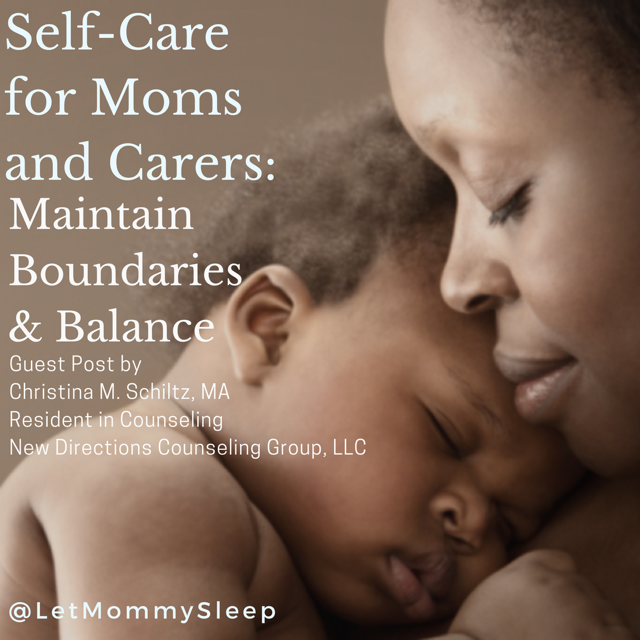Self Care Plan for Moms & Caregivers
As a counselor to new mothers and caregivers, Christina M. Schultz, MA has seen many women experience, “caregiver burnout” or complete fatigue, exhaustion, depression, resentment, loss of identity, and sense of low self-worth. To help those who may be at risk of burnout, Schultz has created this Self Care Plan for Moms & Caregivers.

I often hear women who devalue their self-worth and chose to take care of others as their first and foremost priority. I work to encourage women who are mothers and caregivers to place self-care as their top priority to prevent burnout, to provide resilience and empowerment, and because it helps women to maintain appropriate boundaries in the spousal, parenting, and/or caregiving relationships and roles.
For any women attempting to balance role demands of parenting, work, caregiving, marriage, and relationships with family-of-origin, self-care and boundaries are your key to balanced living. A whole self-care plan needs to integrate the four aspects of you – which includes physical, emotional, social, and spiritual health. Below are a few key suggestions for any self-care plan.
Self Care Plan for Moms & Caregivers
- Build a Support System or Network Outside of Your Spouse, Children, and Parents (Social and Emotional Needs). This is important in order for you to not over rely on the emotional and social needs from your immediate family, and help you to not be over-preoccupied on the needs of your family. I encourage you to find or create your own peer support group of moms, caregivers, and so forth.
- Ask for and Accept Help. Clarify and Strengthen Relationship and Responsibility Boundaries and Division of Labor of the Household, Parenting, and Financial Admin Duties (Emotional and Physical Needs). This is important for you to reduce your role demands and overload if you have the tendency to do too much. This is also your chance to assertively communicate your needs and desires with your spouse and negotiate a win-win for you both. Your spouse should want to find a middleground, and if not, you need to consider how you may be selling your needs short. If you lack the time and have the financial resources, you and your spouse have the option to hire more help with cleaning, childcare, and financial planning and investing duties.
- Assertive Communication of Needs. Learn how to assertively and appropriately ask for help and the love you need with “I” statements (Social and Emotional Needs). If you ask for help clearly, assertively, and appropriately, you will be received with respect and people will tend to meet your needs. It is suggested to encourage children as young as toddler-age to help with chores, and to increase their responsibility over time. It is also suggested to communicate your needs for emotional and sexual intimacy from your spouse, and specific help you need from your spouse since your partner is not a mind-reader. “I” language assertively communicates your feelings with a specific need. As one example: “I feel upset that I make dinner every night each week. I would appreciate it if you cooked Mondays and Fridays or if we ordered take out those nights. What do you think about this?”
- Make time for yourself to exercise, sleep, and eat several balanced meals each day, and attend your annual health appointments (Physical Needs).
- Learn how to say no and prioritize (Emotional and Physical Needs). If you are someone who tends to err on “doing too much” than you have to learn how to say no and dig further on what you may be avoiding with your business. Sometimes business has a secondary gain, such as the avoidance of people rejecting our requests for help and/or avoidance of feeling lonely.
- Pray, meditate, and/or read something grounding once a day for a few minutes (Spiritual Needs). Research has established that people who engage in positive religious and spiritual coping, whether tied to an organized religion or not, tend to be mentally healthier and approach distressing life events with increased resilience. Whether you find calm and strength from attending Church weekly, praying each day, engaging in mindfulness meditation, or reading a powerful deep quote each day, it is an important way to keep yourself in-touch with your deeper values and meaning, beyond the trivialities of life.
- Write down or verbalize three things you are grateful for each day to build more appreciation in your life. (Emotional and Spiritual Needs). This positive psychology exercise is linked to increased feelings of meaning and satisfaction in the here-and-now, and reduced depression.
Categories
- Corporate Care & Partners
- COVID19 Archive
- En Espanol
- Expert Guides
- Hiring a Night Nanny
- Infant Safety
- Infant Sleep Hub
- Newborn Care
- Postpartum Health
- Twins & Multiples
- Work as a Night Doula
- zPost Archives
